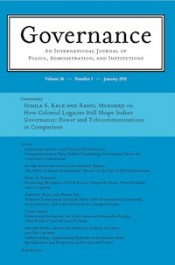Book reviews: Venezuelan democracy, global governance
 In the current issue of Governance, Jason Seawright of Northwestern University reviews Dismantling Democracy in Venezuela by Allan Brewer-Carías. Seawright says the book provides “a detailed and polemical history of constitutional law and related legal regime issues since 1998.” Open access to the review.
In the current issue of Governance, Jason Seawright of Northwestern University reviews Dismantling Democracy in Venezuela by Allan Brewer-Carías. Seawright says the book provides “a detailed and polemical history of constitutional law and related legal regime issues since 1998.” Open access to the review.
And Salvador Santino Regilme of the Freie Universität Berlin reviews Making Global Governance Effective, a volume edited by John Kirton, Marina Larionova, and Paolo Savona. “This book is a rare gem in the field,” says Regilme, “as it comprehensively presents the burning theoretical and empirical scholarly issues about the G8 and its cooperation with other multilateral organizations.” Open access to the review.
Losing the storyline: The hard-edged struggle to shape the post-crisis agenda
Before the financial crisis, write Julie Froud, Adriana Nilsson, Michael Moran and Karel Williams, the governing agenda was shaped by “reassuring liturgies” about the defeat of inflationary pressures and the benefits of financial innovation. But the crisis itself has led to a period of intensified conflict in which rival interests offer “competing stories” about the nature of the crisis and appropriate responses. “So long as no story wins out,” the authors argue, “group identity, institutional affiliation, and crude calculations of interest become more important.” Post-crisis politics, they argue, “is ‘turf wars’ writ large.” Open access to the article: Stories and Interests in Finance: Agendas of Governance Before and After the Financial Crisis.
The power of bad ideas: How conventional wisdom led to financial crisis
In the current issue of Governance, John Gieve (formerly of the Bank of England) and Colin Provost (University College London) explain how a flawed intellectual model discouraged coordination by monetary and regulatory authorities that might have prevented the financial crisis. “This common intellectual framework helps to explain why similar mistakes were made in countries with very different institutional arrangements,” Gieve and Provost argue. Future reforms will put more emphasis on coordination between central banks and regulators, as well as checks against “policy groupthink.” Open access to the article: Ideas and Coordination in Policymaking.
Ahead for public services: an age of “multiple austerities”
 In the current issue of Governance, Martin Lodge of the London School of Economics and Christopher Hood of the University of Oxford examine the effect of the financial crisis on the attitude of OECD governments toward public services. These countries will not follow “a single direction of travel” in response to the crisis, they argue, and not only because fiscal vulnerabilities differ. Two other pressures — demographic and environmental change — may prove equally significant. Some OECD countries are “triply vulnerable” and face a “formidable challenge” in coming years. Open access to this article: Into an age of multiple austerities. Photo: Martin Lodge speaks at Governance roundtable on financial crisis.
In the current issue of Governance, Martin Lodge of the London School of Economics and Christopher Hood of the University of Oxford examine the effect of the financial crisis on the attitude of OECD governments toward public services. These countries will not follow “a single direction of travel” in response to the crisis, they argue, and not only because fiscal vulnerabilities differ. Two other pressures — demographic and environmental change — may prove equally significant. Some OECD countries are “triply vulnerable” and face a “formidable challenge” in coming years. Open access to this article: Into an age of multiple austerities. Photo: Martin Lodge speaks at Governance roundtable on financial crisis.
Must OECD countries fall into “market-driven fiscal crises”?
 “The legacy of the Great Recession for fiscal policy is staggering,” Paul Posner of George Mason University and Jón Blöndal of the Organization for Economic Coordination and Development write in the current issue of Governance (25.1, January 2012). Some OECD countries have already fallen into devastating “market-driven fiscal crises.” Are the rest doomed to follow? Not necessarily, Posner and Blöndal argue. Skilled political leaders can achieve fiscal sacrifice in ways that promote electability. The conventional wisdom — that democratic systems are incapable of exercising fiscal self-restraint — is overdrawn. Open access to this article. Photo: Paul Posner speaks at Governance roundtable on financial crisis.
“The legacy of the Great Recession for fiscal policy is staggering,” Paul Posner of George Mason University and Jón Blöndal of the Organization for Economic Coordination and Development write in the current issue of Governance (25.1, January 2012). Some OECD countries have already fallen into devastating “market-driven fiscal crises.” Are the rest doomed to follow? Not necessarily, Posner and Blöndal argue. Skilled political leaders can achieve fiscal sacrifice in ways that promote electability. The conventional wisdom — that democratic systems are incapable of exercising fiscal self-restraint — is overdrawn. Open access to this article. Photo: Paul Posner speaks at Governance roundtable on financial crisis.
December e-newsletter: Kenny commentary on Governance
The December e-newsletter is now available. The lead item: In January, Governance celebrates its twenty-fifth anniversary. Open access to the lead commentary in issue 25.1 is now available. Charles Kenny asks: Does governance matter? “History isn’t everything,” says Kenny, “and weak governance is neither unfixable nor an insurmountable obstacle to progress.” Kenny is senior fellow at the Center for Global Development and author of Getting Better: Why Global Development is Succeeding (Basic Books, 2011).


India’s blackouts: How history shapes current policy
Last summer’s massive blackouts provoked widespread discussion about failures in Indian governance. In the lead commentary of the new issue of Governance (26.1, January 2013), Sunila Kale and Rahul Mukherji suggest that current problems in the power sector are partly the result of the “powerful effects of historical institutional arrangements.” They contrast troubles in the power sector with telecommunications, “one of the country’s most vibrant and efficiently regulated economic spaces.” The contrast, they argue, can be traced back to colonial-era decisions that had the effect of centralizing responsibility for telecommunications policy, while leaving the power sector largely to state governments. Free access to this commentary.
Written by governancejournal
January 1, 2012 at 10:21 am
Posted in commentary, Current issue